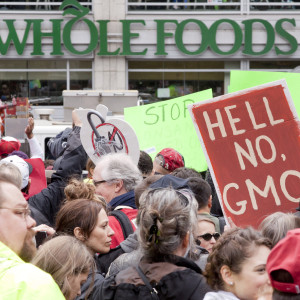Supporters cheered recently as Vermont Governor Pete Shumlin signed H112, a bill requiring labeling of foods sold in Vermont produced with genetic engineering. They were even more pleased when Jackson County, Oregon passed an ordinance banning the growing of GMOs on local farms. Those in favor of such measures have argued they are needed to inform consumers, protect public safety and enhance food quality. These same individuals proclaimed these actions as victories for grassroots activists over moneyed “special interests” bent on pushing questionable food and agricultural products to make a quick buck.
There is a problem with this narrative. It is totally false. The Vermont bill, which is mirrored by efforts in other states across the nation, does not enhance consumer understanding and actually undermines protections provided by the significant regulations already on the books to ensure consumers are accurately informed about the food they are eating. The federal Food and Drug Administration (FDA), which already mandates labels to provide information about the nutritional value and safety of all food products, has stated repeatedly that labels specifically denoting genetic modification are redundant and not needed to protect the safety of consumers. In fact, the FDA Commissioner has specifically come out against state labeling initiatives, an opinion which is shared by the editorial boards of the New York Times, the Los Angeles Times, and the Washington Post.
In addition, three decades of scientific research and analysis have shown definitively that foods improved through biotechnology are just as safe as any other food. Even the European Union, whom opponents often argue we should emulate, after spending more than 300 million Euros over 25 years on 131 studies by 400 independent research teams regarding GMO safety, concluded that “the use of more precise technology and the greater regulatory scrutiny probably make [GM foods] even safer than conventional plants and foods.”
Furthermore, the anti-technology, “Luddite” movement driving these mandates is not a principled, grass roots effort designed to simply give the public more informed choice. It is a well-funded alliance rooted in a desire to increase market share for organic food interests at the expense of consumers. In fact, the Organic Consumers Association’s Ronnie Cummins has stated that “the burning question for us all then becomes how – and how quickly – can we move healthy, organic products from a 4.2% market niche, to the dominant force in American food and farming? The first step is to change our labeling laws.”
Having failed to enact a national GMO food ban, these interest groups have turned to labeling and local restrictions because they believe that they can scare enough consumers into not buying GM food, forcing producers to stop using GMO-based ingredients. The Washington, DC-based advocate Andrew Kimbrell, of the Center for Food Safety, has stated publicly that “we are going to force them to label this food. If we have it labeled, then we can organize people not to buy it.” But even this is not enough for Kimbrell who writes, “I don’t think GMOs should be regulated at all; I think they should be eliminated,” along, he argues, with all agricultural chemicals, leaving only organic foods.
If they succeed in their organic campaign, Americans will pay significantly more for their food. Experience has shown in Europe particularly, that forcing manufacturers to provide labels for food sold in a particular region will raise production costs which will be spread to all consumers in the form of higher prices. In addition, GMOs reduce the overall cost of food because it can be grown with fewer fertilizers and pesticides and produces higher yields. Forcing Oregon family farmers to uproot their biotech alfalfa and corn will drive them back to less sustainable technologies that waste topsoil and require higher pesticide applications to maintain yields. It should also be noted that organics are a luxury item that few American can afford, generally costing 20 to 100 percent more than non-organics.
Crops and foods improved through biotechnology have helped to improve farmers’ lives and livelihoods, reduce hunger, lower the cost of food production and increase food access across the globe. Efforts to reduce access to GMOS are based on ideology and self-interest, not on an objective review of the science. Citizens and lawmakers should come together to reject the kind of anti-technology public policy embodied in the Vermont and Jackson County legislation and oppose similarly misguided efforts across the country that promote unnecessary and redundant legislation by peddling unfounded fears. This will be the best way to truly protect food safety and consumer choice while ensuring that food remains affordable for all Americans.

